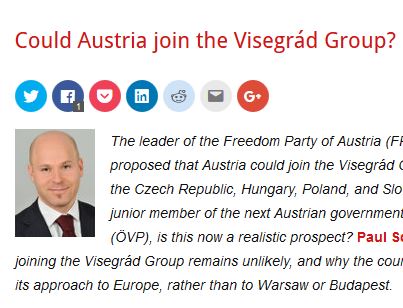After the recent Austrian parliamentary election, the prospect of the country joining the Visegrád Group, consisting of the Czech Republic, Hungary, Poland, and Slovakia, has been discussed more than ever before. The joint past shared by these countries, their geographical proximity, the obvious avoidance of some Austrian politicians to publicly criticise the Hungarian government, and the announcement of a more restrictive migration and asylum policy play into these considerations.
Undoubtedly, national and thematic alliances within the EU do make sense. However, whether a possible membership in the Visegrád Group will be in Austria´s national interest and ultimately strengthen its political influence is highly questionable. In the debate about Europe, Vienna will likely still be inspired by Berlin and Paris rather than by Warsaw and Budapest.
Grave differences
When one looks more closely at the Austrian political landscape, some obvious differences between the country and the Visegrád states can be identified. At this point in time, Austria’s interests are in fact largely dissimilar or even completely contrary to those of the Visegrád countries. The Visegrád four are all NATO members, while Austria is fond of its neutrality. Three of the four countries rely on nuclear power, Austria rejects it. Turkey’s EU membership is unanimously refused in the alpine country, while Poland’s president Andrzej Duda has only recently supported it. The economic and social conditions of Austrian neighbours are – even 13 years after joining the Union – far from comparable, which is reflected by different approaches to economic and tax policies and diametrically opposed positions, for instance when it comes to freedom of movement.
The challenge of posted workers, access to social benefits and in particular the question of family allowances for children living in other EU member states, which has spilled over from the Brexit discussions in the United Kingdom to the region of central Europe, are, by their nature, assessed entirely differently. Furthermore, in contrast to Austria, the four Visegrád countries are EU net recipients. And while Austria is part of the Eurozone, three of the four Visegrád countries are not. Due to increased restrictions on the rule of law and freedom of the press in Hungary and Poland, there also exist serious differences in the esteem of democratic standards and the definition of common European values.
Security and migration issues are currently dominating the political discourse in all central European countries, but unlike the Visegrád four, Austria has made a considerable contribution to the reception of refugees and asylum seekers, trying to integrate more people per capita than, for example, Germany. A fact which has led Vienna to criticise its direct neighbours for their lack of solidarity.
No interest in expanding the group
Despite the traditionally good relations and close economic ties the Visegrád Group has enjoyed with Austria, these few examples illustrate some of the difficulties that would emerge if Austria had thoughts of joining the group. But despite much talk about the issue, the hypothetical accession of Austria is not on the political agenda – neither in Austria nor among the Visegrád countries themselves.
The draw of nationalism is very much at play in many EU capitals, with nationalist politicians intent on promoting their own particular interests, while showing little in the way of European responsibility. Against this backdrop, it should come as no surprise that the EU has experienced difficulties in meeting the expectations of citizens. However, at the end of the day the EU is simply a legal and political framework for aligning different European interests. It is up to the member states whether the opportunities presented by European integration can be realised.
And despite Eurosceptic and anti-migration rhetoric, the Visegrád Group in itself is not a homogenous alliance. Slovakia and the Czech Republic have not shown a high level of interest in following the isolationist and nationalist example of Hungary or Poland. They are instead inclined to join the tentative concept of a ‘core Europe’ presented by Germany and France. And if the new Austrian government proves ready to proactively contribute to a better and safer Union, then unrealistic visions of the country becoming the fifth Visegrád nation will undoubtedly be put to one side.






